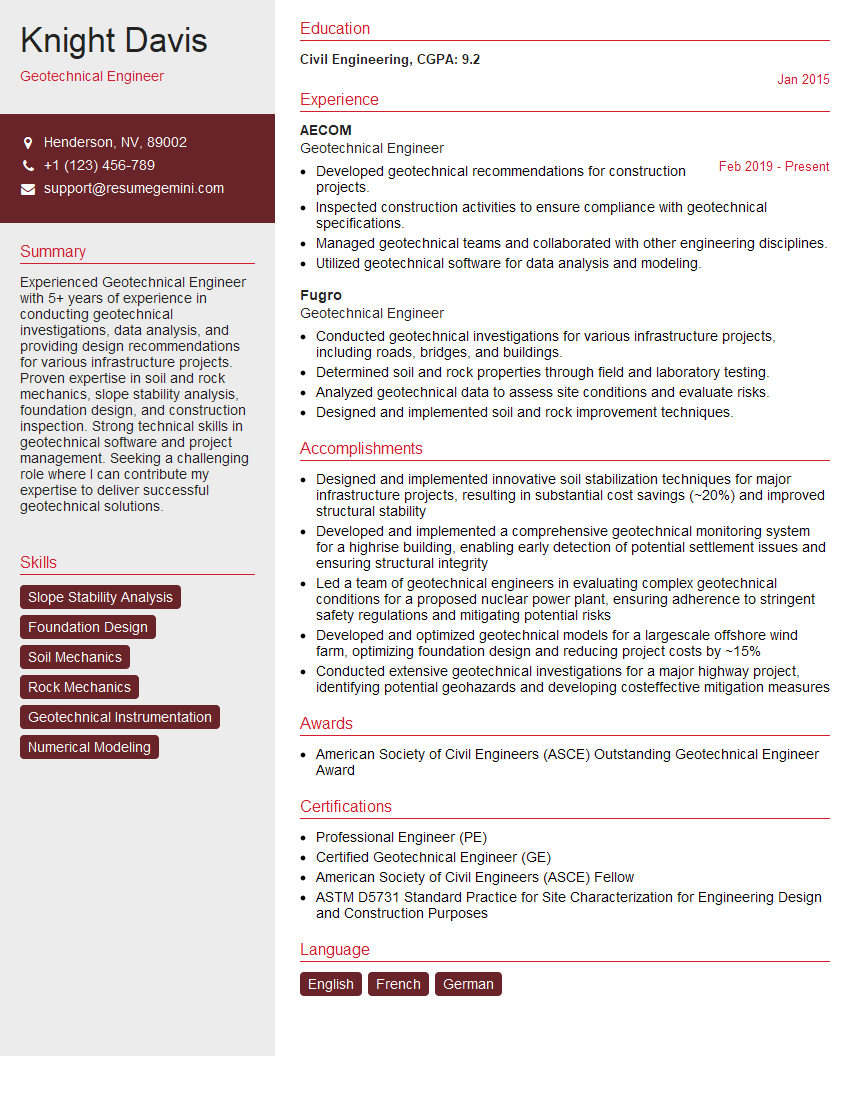Are you a seasoned Geotechnical Engineer seeking a new career path? Discover our professionally built Geotechnical Engineer Resume Template. This time-saving tool provides a solid foundation for your job search. Simply click “Edit Resume” to customize it with your unique experiences and achievements. Customize fonts and colors to match your personal style and increase your chances of landing your dream job. Explore more Resume Templates for additional options.

Knight Davis
Geotechnical Engineer
Summary
Experienced Geotechnical Engineer with 5+ years of experience in conducting geotechnical investigations, data analysis, and providing design recommendations for various infrastructure projects. Proven expertise in soil and rock mechanics, slope stability analysis, foundation design, and construction inspection. Strong technical skills in geotechnical software and project management. Seeking a challenging role where I can contribute my expertise to deliver successful geotechnical solutions.
Education
Civil Engineering
January 2015
Skills
- Slope Stability Analysis
- Foundation Design
- Soil Mechanics
- Rock Mechanics
- Geotechnical Instrumentation
- Numerical Modeling
Work Experience
Geotechnical Engineer
- Developed geotechnical recommendations for construction projects.
- Inspected construction activities to ensure compliance with geotechnical specifications.
- Managed geotechnical teams and collaborated with other engineering disciplines.
- Utilized geotechnical software for data analysis and modeling.
Geotechnical Engineer
- Conducted geotechnical investigations for various infrastructure projects, including roads, bridges, and buildings.
- Determined soil and rock properties through field and laboratory testing.
- Analyzed geotechnical data to assess site conditions and evaluate risks.
- Designed and implemented soil and rock improvement techniques.
Accomplishments
- Designed and implemented innovative soil stabilization techniques for major infrastructure projects, resulting in substantial cost savings (~20%) and improved structural stability
- Developed and implemented a comprehensive geotechnical monitoring system for a highrise building, enabling early detection of potential settlement issues and ensuring structural integrity
- Led a team of geotechnical engineers in evaluating complex geotechnical conditions for a proposed nuclear power plant, ensuring adherence to stringent safety regulations and mitigating potential risks
- Developed and optimized geotechnical models for a largescale offshore wind farm, optimizing foundation design and reducing project costs by ~15%
- Conducted extensive geotechnical investigations for a major highway project, identifying potential geohazards and developing costeffective mitigation measures
Awards
- American Society of Civil Engineers (ASCE) Outstanding Geotechnical Engineer Award
Certificates
- Professional Engineer (PE)
- Certified Geotechnical Engineer (GE)
- American Society of Civil Engineers (ASCE) Fellow
- ASTM D5731 Standard Practice for Site Characterization for Engineering Design and Construction Purposes
Career Expert Tips:
- Select the ideal resume template to showcase your professional experience effectively.
- Master the art of resume writing to highlight your unique qualifications and achievements.
- Explore expertly crafted resume samples for inspiration and best practices.
- Build your best resume for free this new year with ResumeGemini. Enjoy exclusive discounts on ATS optimized resume templates.
How To Write Resume For Geotechnical Engineer
- Quantify your accomplishments with specific metrics and numerical values to demonstrate your impact.
- Highlight your proficiency in industry-standard geotechnical software such as PLAXIS, FLAC, and GEOSTUDIO.
- Showcase your understanding of the latest geotechnical research and best practices.
- Tailor your resume to each job application, emphasizing skills and experience relevant to the specific role.
Essential Experience Highlights for a Strong Geotechnical Engineer Resume
- Conducted thorough geotechnical site investigations, including field exploration, sample collection, and laboratory testing.
- Performed detailed geotechnical data analysis to assess site conditions, evaluate risks, and provide design recommendations.
- Designed and implemented innovative soil improvement techniques to enhance soil stability and bearing capacity.
- Developed and reviewed geotechnical specifications for construction projects, ensuring compliance with design requirements.
- Inspected construction activities to monitor adherence to geotechnical specifications and ensure the integrity of structures.
- Managed geotechnical teams, providing guidance, and mentoring junior engineers.
- Collaborated effectively with other engineering disciplines to develop comprehensive design solutions.
Frequently Asked Questions (FAQ’s) For Geotechnical Engineer
What is the primary role of a Geotechnical Engineer?
A Geotechnical Engineer is responsible for assessing the soil and rock conditions at a construction site, designing foundations, and providing recommendations to ensure the stability and integrity of structures.
What are the key skills required for a Geotechnical Engineer?
Key skills include soil and rock mechanics, slope stability analysis, foundation design, geotechnical instrumentation, and proficiency in geotechnical software.
What are the career prospects for Geotechnical Engineers?
Geotechnical Engineers can advance to senior positions such as Project Manager, Geotechnical Department Head, or Principal Engineer.
What are the challenges faced by Geotechnical Engineers?
Geotechnical Engineers often face challenges related to complex site conditions, uncertain soil behavior, and the need to balance cost-effectiveness with safety and performance.
What are the professional organizations available for Geotechnical Engineers?
Geotechnical Engineers can join professional organizations such as the American Society of Civil Engineers (ASCE) and the International Society for Soil Mechanics and Geotechnical Engineering (ISSMGE).